|
|
|
Sort Order |
|
|
|
Items / Page
|
|
|
|
|
|
|
| Srl | Item |
| 1 |
ID:
163815
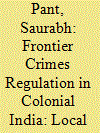

|
|
|
|
|
| Summary/Abstract |
In their pursuit of self-serving goals, sometimes governments create and use various instruments as the means to relatively short-term ends. Such instruments, however, can be tenacious, and have perverse, long-lasting impacts. This paper focuses on one such instrument created during the British Raj: the Frontier Crimes Regulation. Often, the literature on the Regulation focuses on the rationale for its creation from the perspective of the colonisers and refers to the long-term consequences in hindsight, thereby ignoring local voices. However, I show that in 1901, at the time of the drafting of the Regulation, the local colonised population foresaw the potentially lasting pernicious effects stemming from it and voiced their concerns. I demonstrate that these local voices can help us understand the roots of the problems in the Federally Administered Tribal Areas (FATA) of Pakistan today.
|
|
|
|
|
|
|
|
|
|
|
|
|
|
|
|
| 2 |
ID:
102111
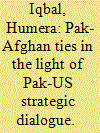

|
|
|
| 3 |
ID:
171938
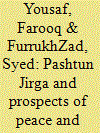

|
|
|
|
|
| Summary/Abstract |
There is growing recognition and appreciation of traditional approaches towards peace and conflict resolution across the world. This article aims to highlight the crucial role and consequential importance of traditional mechanisms of peace and conflict resolution in Pakistan’s terror-hit Pashtun ‘tribal’ areas, formerly known as the Federally Administered Tribal Areas (FATA). These ‘peripheral’ areas of Pashtun tribes stand in relative isolation from the ‘centre’ of the Pakistani ruling establishment. Moreover, with the onset of militancy since 2001 in the Afghanistan–Pakistan region, the situation has turned worse for the local Pashtun tribes. The article discusses the changing role of traditional mechanisms and local structures of peace and conflict resolution, arguing that colonial legacies have failed to prevent, manage, resolve or transform conflicts in post-colonial states such as Pakistan. Furthermore, the Pashtun cultural code of Pashtunwali, along with its various tenets and structures, especially Jirga (Pashtun tribal council) and Lashkar (tribal militia), is also discussed in the article. The article concludes that the changing socio-political situation, along with the rise of the secular Pashtun Tahafuz Movement (PTM), is presenting a challenge to ‘tribal’ Pashtun patriarchal values as well as traditional structures like Jirga in the region.
|
|
|
|
|
|
|
|
|
|
|
|
|
|
|
|
| 4 |
ID:
155117
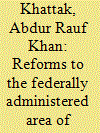

|
|
|
|
|
| Summary/Abstract |
In March 2017, Pakistan formally took the decision to begin a process of incorporating the Federally Administered Tribal Territories into the framework of regular Pakistani law. This article offers an overview of the historical system of governance of the Tribal territories, along with a discussion of the development of the recent reforms and their prospects for success.
|
|
|
|
|
|
|
|
|
|
|
|
|
|
|
|
| 5 |
ID:
097150
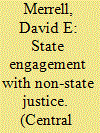

|
|
|
|
|
| Publication |
2010.
|
| Summary/Abstract |
Currently there is a question of whether and how Afghanistan should engage non-state councils of elders to resolve disputes. In order to harness their benefits (e.g. efficiency), control their abuses (e.g. occasional controversial resolutions), and stabilize the resolution of disputes, some have argued that formal links should be established between the state judicial system and non-state councils of elders in Afghanistan. Others argue that mere informal links between the two systems should be established. Still others suggest that prior models of state engagement in Afghanistan should be revived. In Kyrgyzstan, just 65 miles north of Afghanistan, the Tsarist, Soviet and post-Soviet administrations have used various methods to engage non-state councils of elders. Despite these vastly different attempts at controlling local dispute resolutions, elders independently resolved disputes outside of Tsarist and Soviet control and continue to resolve disputes outside of post-Soviet state control in Kyrgyzstan. This phenomenon highlights the need for legitimacy in any models of state engagement that are considered for Afghanistan. If, as observed in Kyrgyzstan, people do not use state-sanctioned local councils in Afghanistan, then their purposes may be frustrated. Therefore, in addition to reviewing the experience with state engagement in other parts of the world, policy makers in Afghanistan should also review the historical and contemporary experience with state engagement in Kyrgyzstan. As the need for legitimacy is reconsidered and applied to the design of models for Afghanistan, it may be more likely that those models will be used by more people in Afghanistan and that their purposes will be furthered.
|
|
|
|
|
|
|
|
|
|
|
|
|
|
|
|
|
|
|
|
|